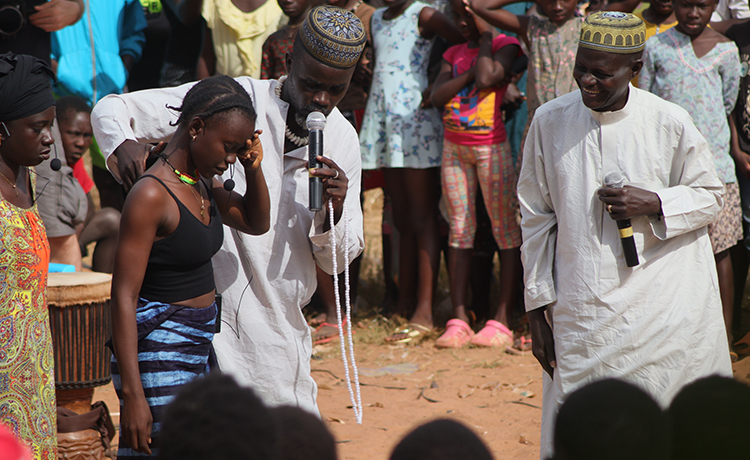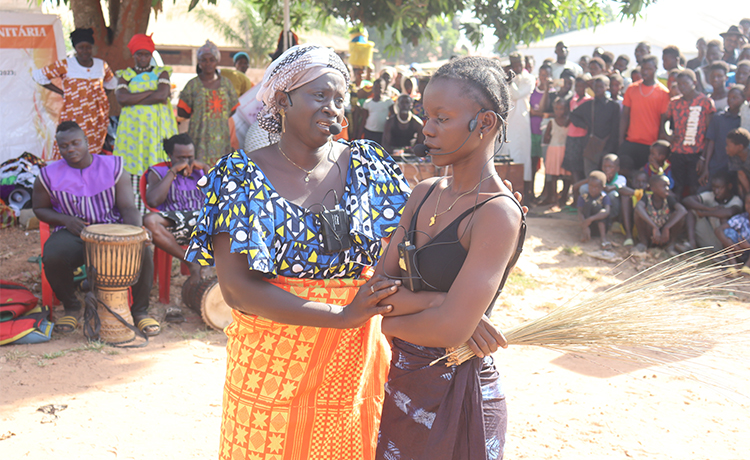News
A travelling theatre in Guinea-Bissau sparks conversations and changes minds about gender-based violence
- 29 February 2024
News
BIOMBO, Guinea-Bissau – “The piece on forced marriage touched my soul, because I am a victim of this harmful practice,” said Domingas* in Quinhamel, in the western Biombo region of Guinea-Bissau.
“I speak with my mother every single day about my marriage to an older man, but she always says ‘these are our ways, our traditions’. So I’m really happy with this caravan,” she told UNFPA, the United Nations sexual and reproductive health agency.
The travelling theatre is part of a recent nationwide campaign to raise awareness about the damage that forms of gender-based violence can do to young girls’ physical and mental health, and to their ability to fulfil their potential.
“Female genital mutilation has a lot of harmful consequences for women and girls, including during pregnancy or delivery,” said Delina Amelia Mendes from Bula, in the Cacheu region. “It can result in the death of a newborn or even the mother.”
To help counter practices such as female genital mutilation and child marriage, 25 actors from the National Ballet, the Nossa Patria Amada, performed three plays at local markets. Known as Lumos, the markets bring people together from all sectors of society, and are a good forum for sparking conversations and spreading awareness about the need for social and behavioural change.
Each play is between 30 and 45 minutes and incorporates a mix of theatre, dance and music. They are followed by an interactive session, during which audience members can engage in discussions with the actors.
“We want to create a meaningful dialogue instead of limiting ourselves to one-way communication,” said Marliatu Djalo, President of the national committee against harmful practices in Guinea-Bissau.

Acting against inequality
In Guinea-Bissau, research from 2019 showed that more than half of all girls are subjected to female genital mutilation, and more than one quarter were married before they turned 18 – some as young as seven years old.
Deeply entrenched patriarchal systems and widespread gender discrimination mean these practices are still pervasive in the country. And while advocacy and human rights initiatives have helped to reduce child marriage rates, still too many are robbed of their childhoods and sent off to look after their new husbands, homes and children, particularly in more remote areas.
Such inequalities often force girls to abandon their studies, blighting their employment opportunities, violating their human rights and denying whole communities their contributions. Child marriage also heightens the risk of intimate partner violence by more than 20 per cent.
But empowering people – especially women and girls – with the tools to defend their sexual and reproductive health and rights can unleash social and economic benefits and lift the prospects of generations to come.
“Our parents should allow us to choose the partner we want to stay with or marry for the rest of our lives, of our own free will,” said Giovanna Carlos Gomes, a student in Quinhamel, in the Biombo region, after one of the performances.

Changing social norms through culture
The Ministry of Social Action, Family and Promotion of Women ran the initiative, in collaboration with UNFPA and partners. The performances ran from 25 November to 10 December 2023, in line with the 16 days of activism against gender-based violence campaign.
More than 500 people watched the plays each day, totalling some 7,000 throughout the caravan's journey. The audience actively participated in the exchanges, discussing issues such as adolescent pregnancy, gender-based violence, and HIV and AIDS prevention.
“It's great to bring theatre to these communities,” said Domingos Quade Mbana, a member of the National Ballet. “Through plays we can convey a message to the population, and awareness becomes easier.”
With nearly one in three women and girls around the world estimated to have been subjected to gender-based violence, UNFPA is working to ensure more resources and greater political power are committed to ending it.
To accelerate the elimination of female genital mutilation and other harmful practices by 2030, UNFPA is committed to strengthening the capacity of local actors in Guinea-Bissau. Interventions will focus on advocacy, influencing decision-makers, and promoting social and behavioural change to make life safer and more equal for women and girls.
“Let us recommit to concrete actions that will protect women and girls in all their diversity,” said UNFPA Executive Director Dr. Natalia Kanem. “Let us recommit to building a world that is more just, inclusive and equitable, and where women and girls can live in peace.”
*Name changed for privacy and protection